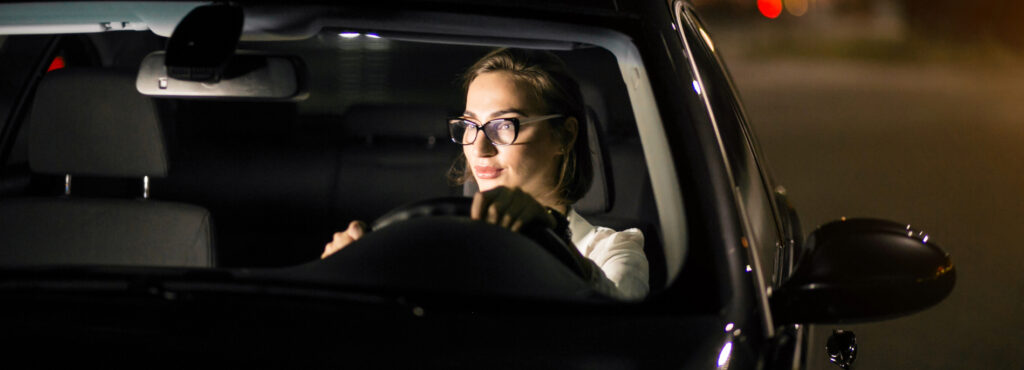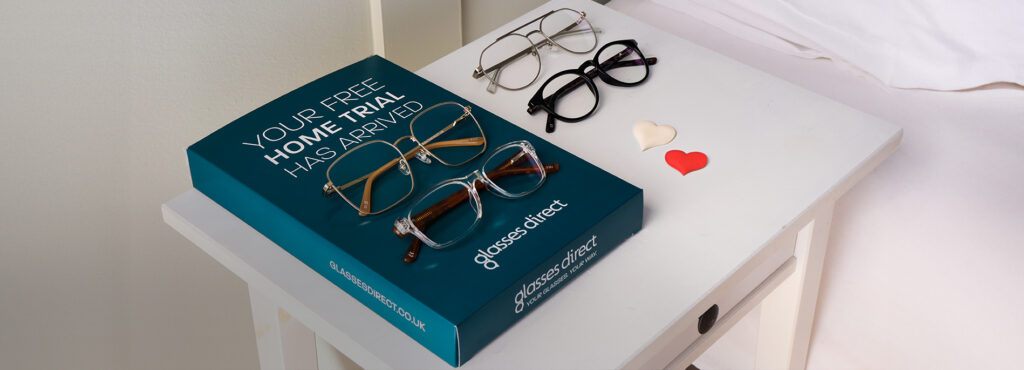Headlight glare, blurry vision, and eye strain can make driving at night both stressful and dangerous — especially in challenging conditions like rain, fog, or low light. Glare from oncoming headlights, wet roads, and digital screens can cause fatigue and discomfort, reducing your ability to focus. Fortunately, we’re revealing the best glasses for night driving which help reduce reflections, sharpen contrast, and improve clarity—so you can drive more safely and confidently after dark.
Why is driving at night so tough on your eyes?
Driving at night puts extra strain on your eyes compared to driving during the day. Low-light conditions, glare, and constantly changing brightness levels all make it harder to stay focused. As your pupils dilate to take in more light, they become more sensitive — especially to sudden bursts of brightness from:
- Headlights from oncoming traffic
- Streetlights and traffic signals
- Reflections on wet or shiny road surfaces
- The glow of digital screens like sat navs and dashboards
📊 Did you know? A 2024 Which? survey found that 76% of UK drivers worry about collisions caused by headlight glare — highlighting how significant this issue has become.
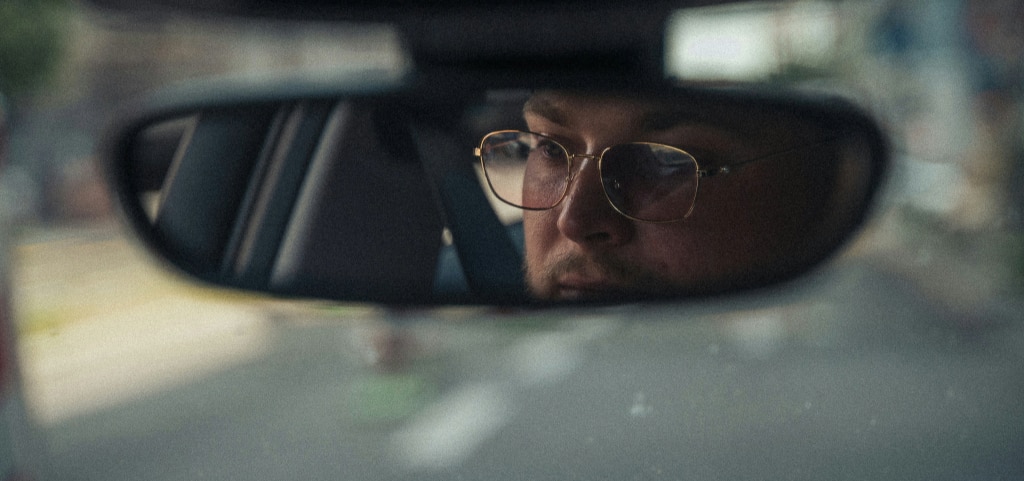
How prescription glasses can improve night driving?
If you wear prescription glasses or have astigmatism, you may experience these challenges even more acutely. Reduced depth perception and a narrower field of vision can lead to increased eye strain and blurred vision, making it harder to judge distances accurately. This not only slows your reaction time but can also affect both comfort and safety on the road. The best glasses for night driving feature advanced anti-glare coatings and precisely tailored prescriptions that enhance visual clarity and adapt perfectly to your individual needs.
❗ Remember: If you notice ongoing night vision problems (night blindness), it’s worth booking an eye test with your optician. This will rule out any underlying vision issues and ensure your prescription is up to date. Most importantly, that you’re wearing the best glasses for night driving to improve visibility and stay safe on the road.
How age and eye health affect night-time driving?
As we age, our eyes naturally change. After 40, presbyopia — a common, age-related eye condition — can make it harder to focus on near and mid-range distances. This affects how clearly you can see your dashboard, read road signs, and spot potential hazards in low light.

Do anti-glare glasses help you see clearly at night?
Yes, anti-glare lenses really do work. These lenses feature a special anti-reflective coating that minimises glare and reflections on your lenses, allowing more light to pass through to your eyes. The result? Sharper, clearer, and more comfortable vision when driving in low-light conditions.
👓 Key benefits:
- Reduced glare from oncoming headlights, streetlights, and wet roads
- Improved contrast and sharper night vision
- Less eye strain during long drives
- A more comfortable, confident driving experience
At Glasses Direct, you can add an anti-reflective coating to single-vision, bifocal, and varifocal lenses, so you can tailor your glasses to your prescription and driving needs.
💡 Top tip: Choose lightweight, secure-fitting frames that stay comfortable and prevent distractions during long drives. Sports-inspired styles like Oakley or Harrington Sport combine practicality with modern design.
If you wear contact lenses, ensure they’re suitable for extended wear and don’t cause dryness, which can worsen glare and discomfort when driving at night.
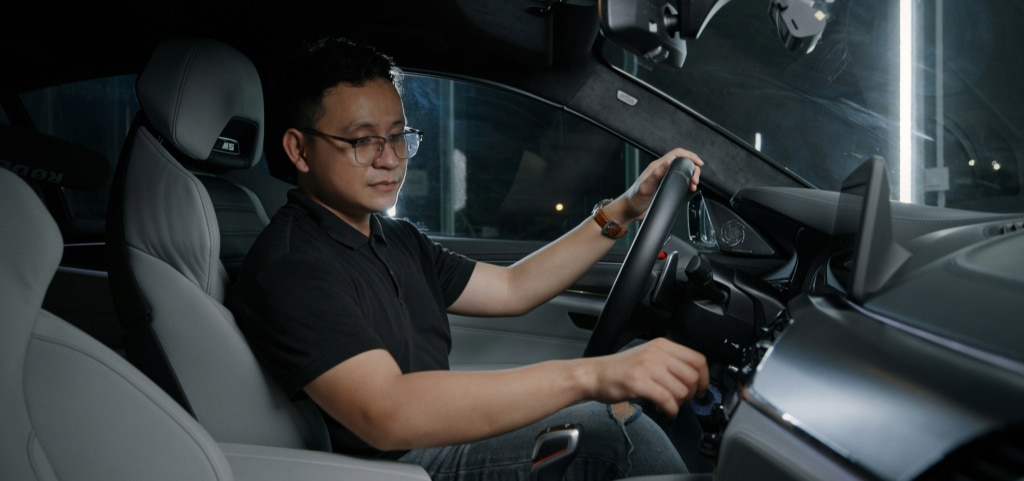
Do yellow-tinted glasses help with night driving?
You may have seen yellow-tinted lenses marketed as “night driving glasses,” but research shows they don’t actually enhance night vision and may do more harm than good.
❌ Why they fall short:
- They reduce the amount of light reaching your eyes — not helpful in the dark!
- They distort colours and reduce visual accuracy
- They filter out specific wavelengths (primarily blue light), which can affect overall clarity
✅ Better alternatives:
- Clear anti-glare lenses for maximum light transmission
- Transitions® XTRActive® lenses which adapt to changing light and help reduce headlight glare during both day and night-time driving, ideal if you’re sensitive to bright light
- For daytime driving, Transitions® Drivewear® lenses adapt to changing light conditions, reducing glare and enhancing contrast for safer, more comfortable vision
- Polarised lenses reduce reflections from wet or shiny surfaces (like car windscreens and icy roads) helping you drive safely during the daytime
🚗 Takeaway: Skip the yellow tints — clear anti-glare lenses are far more effective and remain one of the best glasses for night driving, providing consistent clarity and comfort.
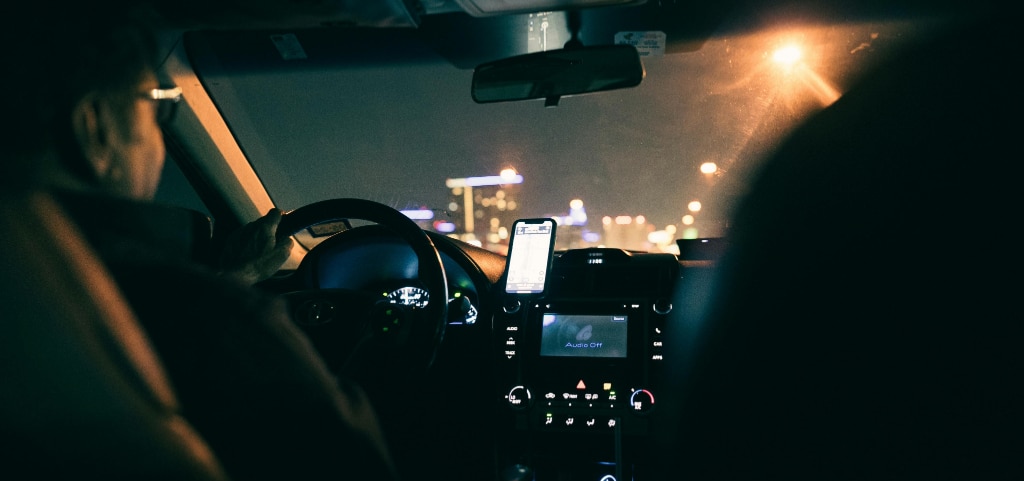
Are blue light glasses good for driving at night?
If you’re considering blue light glasses for driving, it could actually be a smart choice. Modern vehicles are filled with screens — from sat navs and infotainment systems to smartphones and digital dashboards. These all emit blue light, which can lead to:
- Eye strain and visual fatigue
- Difficulty focusing in low light
- Disrupted sleep patterns after long drives
🔵 The solution? Blue light filters
Blue light filtering lenses help by:
- Blocking a portion of high-energy visible (HEV) blue light
- Reducing eye strain by blocking digital glare
- Improving contrast and comfort in low-light conditions
✨Pro tip: Combine blue light filters with anti-glare coatings for the best glasses for night driving, giving you the ultimate protection from glare and digital strain.
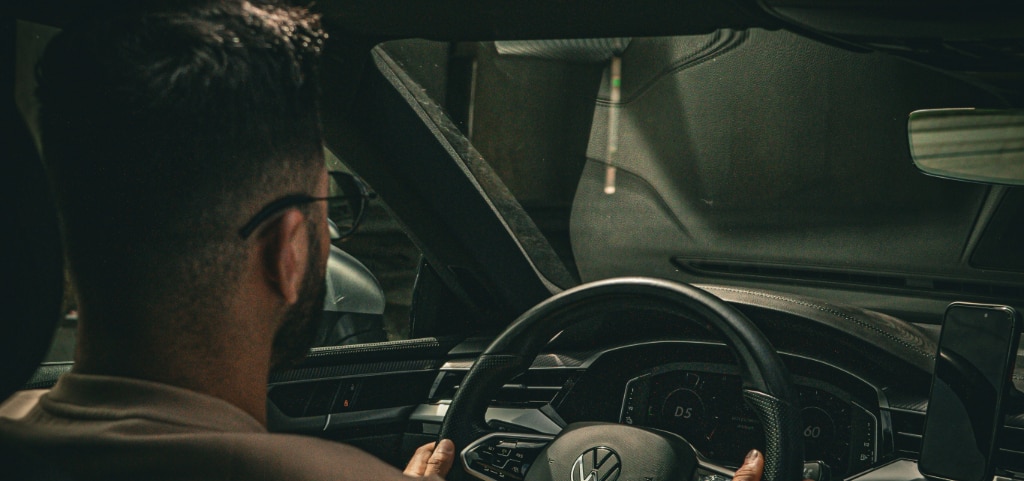
See clearly and drive confidently at night
Night-time driving doesn’t have to feel tiring or stressful. With anti-glare coatings, blue light filters, and well-fitted eyewear, you can reduce reflections, improve clarity, and stay comfortable on every journey, whatever the conditions.
For tailored eye care and expert advice, visit your optometrist, or eye care professional to make sure you’re wearing the right driving lenses for your needs, especially if you use contact lenses or have astigmatism.
At Glasses Direct, our expert opticians check every single prescription and order to ensure your new pair of glasses fit perfectly and perform just as they should.
🌙🚘 Our anti-reflective coatings for night driving help minimise reflections and improve visibility in low-light conditions. Choose from a range of prescription or non-prescription eyewear options to help you stay focused, confident and safe behind the wheel.

